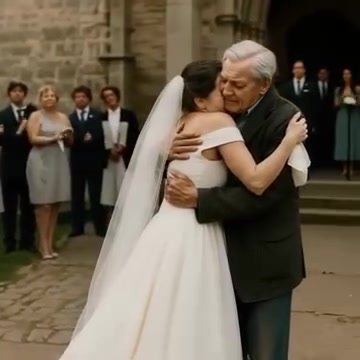Every day at 4:30 a.m., Claire Dawson arrived at Maple & Grain, a cozy little bakery tucked into a Portland neighborhood that was slowly yielding to high-rise condos and overpriced cafés. At 33, Claire had become a fixture—known for her flaky croissants, cinnamon rolls that practically melted in your mouth, and a calm, caring presence that lingered even after she’d left the room.
Her most meaningful routine had nothing to do with what was on the menu.
Before the city stirred and the bakery doors opened, Claire would wrap a warm cinnamon bun, pour a cup of black coffee, and slip quietly out the side door. She walked two blocks to an old wooden bench near a faded bus stop. And there, she left the breakfast alongside a folded napkin bearing a handwritten note: “Wishing you a peaceful morning.”
That same man was there every day. Gray hair. Weathered coat. Quiet. Always sitting alone, hands resting on his lap as if he was waiting for something—or someone. He never begged. Never spoke. Never even looked directly at anyone.
Claire never asked his name. He never gave it. But every day, she left him food.
Her coworkers noticed. Some rolled their eyes.
“She’s wasting food on someone who likely doesn’t even appreciate it,” one muttered.
“She’s going to be exploited,” said another.
But Claire persisted. Not because she expected thanks. Not because she sought attention. She acted because she saw someone who appeared forgotten by the world—and she refused to join in that neglect.
When new owners took over the bakery, Claire was called into an employee review.
“Your dedication is remarkable,” the manager said carefully. “However, some customers mentioned feeling… uncomfortable seeing a homeless man near our establishment. Perhaps consider donating to a shelter instead?”
Claire nodded politely. She changed nothing—except to arrive 15 minutes earlier so no one would observe her leaving.
She believed her act of kindness went unnoticed. Until one morning, a new cashier whispered to a customer, “She’s been feeding that man for years. Every single day.”
The customer glanced over and replied, audible to Claire:
“Poor girl. Believes she’s making a difference.”
Claire didn’t respond. She continued folding dough, continued rolling pastry—because it was never about what others thought. It was about acknowledging someone too many people ignored.
“You’re too soft-hearted,” her mother once told her. “You give too much.”
But Claire did not believe kindness was a finite resource. It was something that multiplied with generous distribution.
Her fiancé, Ben, understood that.
A children’s librarian, he admired how Claire always prioritized kindness. “You don’t only bake for people,” he told her once, “you truly see them.”
As their spring wedding approached, Claire ordered their cake from the bakery she cherished and invited all her coworkers. Ben playfully teased her about inviting half the city, but in truth, he admired her more for it.
Two days before the ceremony, a letter arrived. Hand-delivered. No return address. Inside was a single sentence in neat handwriting:
“Tomorrow I will come—not for cake, but to repay a kindness.”
Claire read it again. Something about the handwriting felt familiar—but she couldn’t place it.
